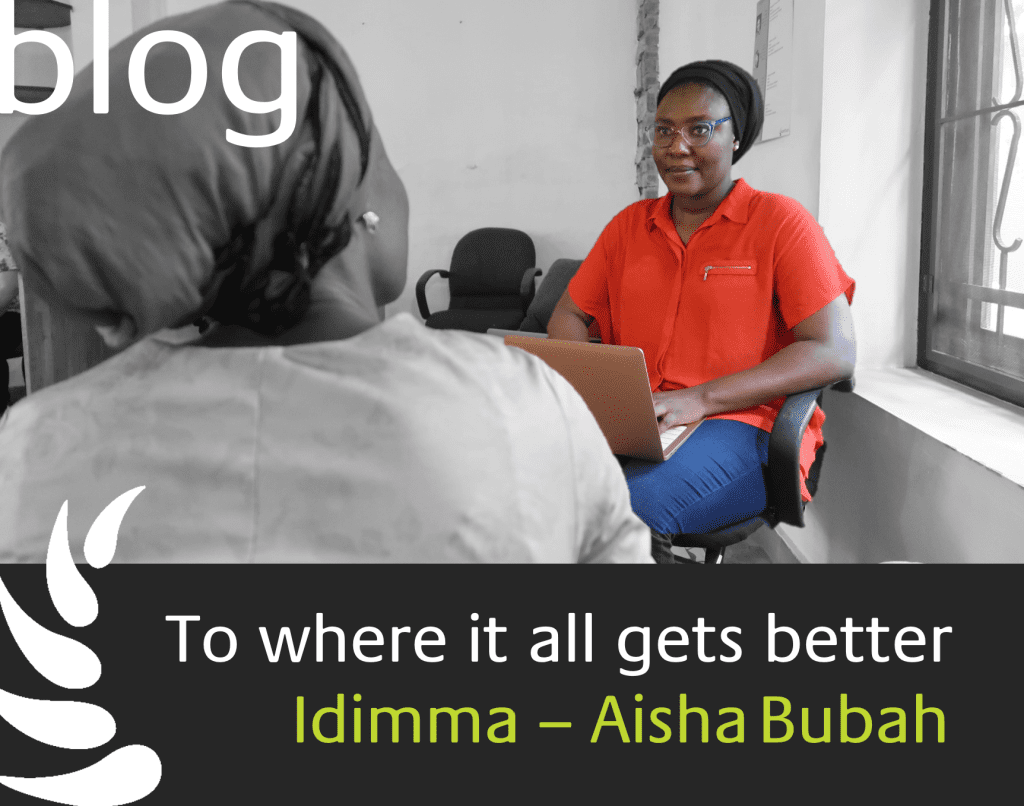Aisha Abdullahi Bubah addresses an important topic: the state of mental health in today’s society. Her home country, Nigeria, with a population of over 212 million people, offers only 250 psychiatrists and an even lower number of psychologists. Roughly, only one out of a million Nigerians has access to mental health support. Aisha’s organization Idimma envisions a world with strong support systems that foster mental well-being through community-involved support programs that train lay counselors and psychological first aiders with a strong referral system.
To where it all gets better
There was a strong vibration like I had never felt or knew could be possible. A type that moved objects around and shook the core of my being. That is what the impact of a bomb blast felt like.
I come from a region in Nigeria that is prone to ethno-religious riots and has ongoing terrorist attacks. I thought it would be this way only for a short while, not lasting over a decade. I lost a dear relative on the day bombs exploded for the first time where I lived. I was not sure how to feel about his sudden death, and for many years after, I tried to pretend like it did not happen. It felt unfair, and I did not have the platform or the chance to voice exactly what I felt or thought of the event. The insurgency kept spiraling out of control. More relatives got displaced and had to leave the homes they grew up in for safety. I hear them talk about their experience sleeping in the bushes to avoid getting slaughtered. I hear them talk about some of our missing relatives. And I always think, where does all this trauma go? I can vividly recall the intense fear of not knowing whether we would be dead any moment or if a time would come where the insurgency ended, and life went back to normal. However, a part of me knew that ‘normal’ would never be normal again. I did not know the words to express the overwhelming feeling of grief, anxiety, and fear of the future that I felt. The uncertainty and fear of what the conflict might escalate to influenced how I viewed life, like it was not worth making an effort to live.
I remember, as a child, watching TV with my mother. We saw a wedding happen in a war-torn country, and I asked, “How can they have fun knowing they could be dead by a bomb blast any minute?” She said, “Life has to go on, and death is not so scary when you feel that there is nothing new to lose.”
Only later did it make sense to me. I understood that the trauma doesn’t just go away. It stays, or it manifests in many other ways, good or bad. I could not stop thinking about the state of mind of victims that have been physically and socio-economically incapacitated by these acts of violence. However, I wanted to come out of this state of constant anxiety, fear and stress, and also help others to find happiness in spite of their struggles.
At the age of 16, I decided to study psychology. I went to university with the curiosity to understand human behavior and make sense of all the events that had marred my childhood, to understand why people choose violence, to understand why people abuse drugs, like my childhood friend, and why society considered him an unworthy and bad person.
I found a bigger purpose. There is a general misconception in my place that mental health is something outside of our bodies, influenced strictly by external factors, sometimes superstitious.
People struggling with mental health challenges are asked to pray more but are not provided with support and care. I found this faulty because we cannot pray away cancer without medical care, then why so for mental health? Mental health is who we are. It is in us. The mind is not outside the body. I realized that there is a way, that we don’t have to live with our traumas or continually get haunted by them. There are ways to build positive skills that can make one look forward to and build a thriving life not marred by violence.
Today, I run a mental health organization that works towards breaking barriers in access to mental health support. We also pioneered the first mental health helpline on the national emergency number of Nigeria.
This is what we envision: By providing community-involved mental well-being programs that train lay counselors and psychological first aiders, we will bridge the gap in awareness and access to basic psycho-social support, especially at grassroots levels. Imagine a community in which every tenth person has learned counseling skills. By creating a society with better listeners and better communicators, a society that is broadly more empathetic and caring for each other’s needs, we will be creating a mentally healthier society that is broadly able to heal itself. In crisis situations like COVID-19 or in crises where people cannot be so mobile, this will make a huge difference. This is a model for self-help regarding mental well-being that we have tested by training over 100 lay counselors in the past 2 years, who are currently providing mental health interventions in their communities.
NOTE THE DATES: on the 17th and 18th of December 2021: Aisha, and fifteen 15 other kantharis will share their personal journeys and solutions for social issues that have affected them during kanthari TALKS.
Aisha will be speaking on SATURDAY 18-12-2021 in the 4th session: ‘Fight discrimination, advocate for mental health’: 10:30-11:40 IST.
More details about her and the other speakers and the timings of the event that will be live streamed, can be found on http://www.kantharitalks.org/ Don’t miss it.
Thank you for sharing this post and this link.
Read more kanthari blog posts on: https://www.kanthari.org/coronablog/



